A spotlight on the new faces taking on the Club Championships 2021 in the women's division.
October 22, 2021 by Edward Stephens in Profile with 0 comments
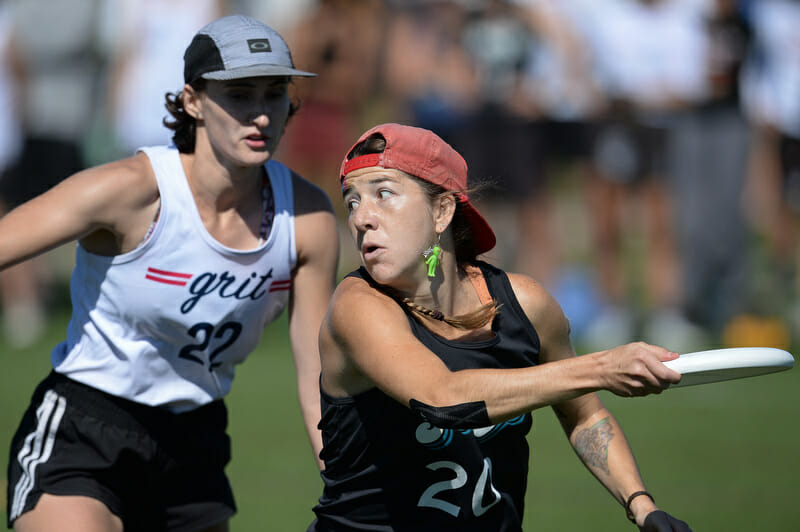
Ultiworld’s 2021 coverage of the club women’s division is presented by Spin Ultimate; all opinions are those of the author(s). Find out how Spin can get you, and your team, looking your best this season.
Every year new players fight their way to Nationals. Some have spent years working toward a spot on a Nationals-level team, others have stayed with their team for multiple seasons working to get their program to Nationals, and others find themselves going after only a few seasons of playing ultimate. Each player’s story is unique and sheds light on the various ways that people first find ultimate, get hooked on ultimate, and stay with ultimate.
Erin Goding, Florida Tabby Rosa, Age 30
Erin Goding found ultimate frisbee through soccer. Sort of. She had played soccer in high school in Lakeland, FL, and at the 2010 fall semester activities fair at University of Central Florida she went on a hunt for the club soccer booth, thinking that it would be a good way for her to make some friends doing something she liked. But when she started talking to the players there, “they kind of looked me up and down. And then one of them said, ‘You know this is club, right?’” Oof. Reeling from that callous assault on her self-worth, she found the UCF Sirens representatives. They were much friendlier, so she signed up.
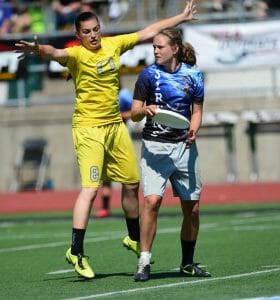
It was love-at-first-tournament for Goding. From then on she played constantly. Not just practices and tournaments, but pick-up almost every day. “I would never leave. I was like, ‘I’m gonna throw with whoever until every last person is gone.’” Clearly it helped. Her senior year with the Sirens was extraordinary: she was a key piece on a 3rd-place finisher at College Nationals in 2014. (In true UCF fashion, Goding played all but two points at the tournament that year.) But she was so steeped in her college life and her college team throughout the four years that she still didn’t have any idea about the wider world of ultimate outside of college. “Club was not on my radar,” she admits.
She kicked around for a couple of seasons with colorfully-named teams who weren’t all that serious. There was a mixed team called Mooseknuckle, and an Orlando women’s team called W-Omen (a play on the men’s club, Omen). Then she played women’s with Fyiff the next season.1 “It was all a blur,” says Goding.
That changed in 2016 with the advent of Orlando Friends, a mixed team constructed to capitalize on the recent success of both UCF college programs. They had everything on their side — a great roster, a concordant drop-off in talent in Atlanta mixed to create a power vacuum, and a killer stick-figure logo — except a little magic in the Regional final, which they dropped to in-state rivals Gainesville G-Unit.
From then on, she has played with the best women across the state on Tabby Rosa. But with Tabby, there was a bit of a chip-on-your-shoulder attitude. They were always falling to Ozone and Phoenix in crunch time. That inferiority complex was compounded by the season, she doesn’t remember which exactly, that Goding and a carload of teammates drove north to try out for Ozone. None of them made it.
“A lot of [our Regional struggles] was intimidation,” says Goding. The expectation was somewhere between, “‘it’s going to be hard for us to win’ and ‘we’re not going to win.’” Whether it was a self-fulfilling prophecy or just the talent playing out, Tabby didn’t win.
For this year, the team put a lot of focus on changing that mindset — pretty successfully, according to Goding. Still, though, she says she “wasn’t trying to get [her] hopes up” about the potential for Nationals. When they cemented the long-awaited victory over Ozone on Sunday, her attitude shifted. “It was really surreal. We’ve been trying for this for so long.”
She realized, too, how much she’s been looking forward to seeing and playing against the very best teams in the world, the one’s she’s looked up to ever since she started to plug into club. She has one obsession in their pool that is very healthy indeed, to put it charitably. “Do you watch Last Week Tonight?” Goding asked me at the start of our call. “Well, I’m John Oliver and Brute Squad is Adam Driver.”
Stanning aside, Goding has known for a long time that she is a good enough player to compete on a Nationals team against the best. And at times there was a temptation to commute in order to get herself to that point. In the end, though, “I’m glad I stuck with [Tabby] so we can go to Nationals together. Florida will never be a contender if everyone goes to where there are already Natties teams.”
Lauren ‘LP’ Piontek, Boston Siege, Age 29
Lauren Piontek first played ultimate during summer league in St. Louis in 2009, just before her senior year in high school. A friend had invited her because they “just needed women,” and she was happy to have a way to stay in shape. She wasn’t just green when it came to ultimate. “The team was called ‘Blue Moon,’ and I was ignorant enough not to know that was a beer.”
She liked it enough to continue playing with the open team at Kirkwood High School — one of three girls to do so. She remembers that the team benefitted from convincing MyCole Pruitt, an NFL tight end since 2015, to pick up with them, but somehow his Wikipedia page fails to mention it.
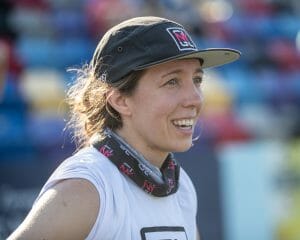
It wasn’t until the next year, however, that LP fell in love with the game. During her freshman year at Missouri, she was one of only two rookies who knew how to throw a flick before the first practice. The team traveled to Grinnell College that fall for Elephantitis — the tournament experience hooked her completely. She quickly became one of the best players on Terror Mizzou.2
For all of their branding brilliance, Terror Mizzou weren’t very good during those years. Neither was Free Ride, LP’s first club team, a mixed team outfit out of Columbia. “We never made it out of the section,” LP said. But Piontek was still improving, and when she moved to Cleveland after college in 2015, she fit right in with the much more competitive Notorious CLE. It began to dawn on her that she could hang with the sport’s best. That was especially true after she “discovered lifting.” But knowing you are good enough and actually qualifying for Nationals are two different beasts. Cleveland couldn’t break through.
A stint in Indianapolis was fruitful. She played club mixed with Tequila Mockingbird, who finished strong enough to qualify for Select Flight. More importantly, in 2018 she co-founded the women’s semi-professional club team Indy Red as part of a movement that would become the Premier Ultimate League. By the next season, she had moved on to New York, staying in the mixed division with XIST. Like Notorious a few years earlier, XIST couldn’t quite put together a run when it counted that fall. She reached the highest level of competition she’s played with New York Gridlock, losing a nail biter — or, if you remember the PA work during the game, “barn burner” — of a semifinal game to Raleigh Radiance in the inaugural PUL Championship Weekend.
LP played with Gridlock again this summer even after moving to Boston. But club? “I actually wasn’t going to play. I didn’t want to play mid-level mixed.” But she took a chance on Siege. “Got hooked at the first tryout I went to.” Fast-forward to Northeast Regionals: Siege are locked in a tight game-to-go with Albany Rebel Rebel, the Metro NY Sectionals champs projected by some as a potential bracket spoiler, for a chance to make LP’s long-time dream a reality. “I’m so proud of this team. I was like, ‘Holy cow, we did it!’ Caroline Weinberg pulled down [the game-winning goal], and I probably could have collapsed right there. My 12th year of ultimate, of justifying it to my parents who were always asking, ‘Why aren’t you at the big tournaments?’ and ‘When can I watch you?’”
Charlotte Koerner, Pittsburgh Parcha, Age 29
Charlotte Koerner … that name rings a bell … where have I…
That Charlotte Koerner. The fact that someone who makes plays like that hasn’t been to Nationals until this year tells you something about how hard it can be to break through in this beautiful, stupid sport.
Koerner’s path to this point seems like it should have paid dividends years ago. A high school athlete from Memphis, she was first exposed to ultimate in an informal way during a summer program. The idea of frisbee stuck, so when trying out for D-I soccer her freshmen year in 2010 didn’t pan out, she sought out the team at West Virginia.
Not that she ever gave up soccer. Koerner was a double athlete for the entirety of her college career, playing both club soccer and club ultimate year-round.3 The ultimate team was good and getting better throughout her tenure, culminating in a secondnd-place Regionals finish in the spring of 2014. They even beat perennial Ohio Valley bullies Pitt that year, a feather in any WVU student’s cap. But they didn’t come particularly close to going to Nationals, thanks to the presence of a stacked Ohio State team that would go on to win the Championship. Surely her time would come soon, right?
The summer after her senior year she started to commute to Pittsburgh, a little over an hour from Morgantown, to play with the women’s team Hot Metal. That first year they dropped the game-to-go to Philadelphia Green Means Go. The year after that, they came up a few points short to DC Scandal in the final, and there was no second bid. So it went. Koerner stayed with the team through 2018, then switched to play mixed with Alloy for the 2019 season. Alloy had played their way to the cusp of Nationals in the past, but that year they couldn’t make it in to the game-to-go.
“Nationals has been a goal of mine. I wanted to go at least once while I was still playing.” But how to accomplish it? She had moved to Pittsburgh in 2017 and was committed to the city. There was enough talent there, she thought, that she shouldn’t have to keep coming up short. And a year after the disbanding of Hot Metal — a year that stretched into two — the ultimate scene had time to cool off and re-shape. So she started to kick the tires on forming a new team. “It was the right time for the talent in Pittsburgh to come together. I wanted to make it happen for the women athletes of Pittsburgh.” And so: Parcha. Koerner is one of the captains.
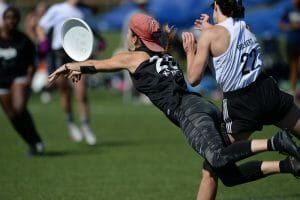
They found themselves in a classic Pittsburgh club situation at Mid-Atlantic Regionals: one bid shy of true comfort. But Koerner has helped build a team-wide “resulture” — her word for the combination of resilience and positive culture — to help them weather the challenges of a long weekend better now than in the past. “We stayed really calm. We played even lines for the whole team for the entire tournament, and we never got down on ourselves.”
Koerner had been visualizing the moment of victory heading into their final against Grit for the one and only spot at Nationals. And yet, the finale of that universe point win took a different form than she had anticipated. “I had thought I would be in tears, crying my eyes out. But I was just deep breathing like, ‘Holy shit.’”
Koerner is the consummate captain. Despite the fact that I made it clear during the interview I wanted this small story to be about her, most of her thoughts on this season came from a team perspective. But when I pressed her a little on the subject of what she expects from the weekend in San Diego, she admitted, “I want to get some really sick layout D’s.” She pivoted away from herself a moment later, however, adding, “We’re excited to throw some chairs.”
Cameron Helm, San Diego Wildfire, Age 22
Cameron Helm knew about ultimate before she started college at Arizona State, but just barely. Her class had done a unit on it in P.E. in junior high or elementary school in Santa Clarita, California. Even though it was a really disorganized version of the sport, “it just stuck in the back of my head,” she said. So when she was looking for a new sport at the activities fair in 2017 — she had been a swimmer throughout high school but did not want to commit to anything like the lifestyle required for collegiate athletics — she put her name down with Caliente, the women’s team. Also: water polo. It was a toss-up.
Caliente won her over for good as soon as they went to K-Fall in San Diego that first semester — one of those classic break-in-the-rookies events. “I loved everything we did. Practice, tournaments, bonding events.” The summer of 2019, after her sophomore year, she fell into a club season with Pivot, one of the Phoenix mixed teams that was the precursor to Lawless. “I was just showing up and playing,” says Helm. Her teammates, however, were gunning for a strong result at Southwest Regionals, and maybe even a bid to Nationals. Helm remembers thinking, “You guys are so crazy. It’s just frisbee.”
The pandemic cut short Helm’s time with her college club, though. She didn’t have major ambitions for her junior and senior seasons, exactly, but it had a major dampening effect on her time in school. “I feel like we just missed out on a lot of fun times.”
After she graduated this spring, she got an internship for the summer in Montana. She figured that took her out of the picture for the newly-forming Lawless. She entertained the idea of joining Moondog, but it would have been too far for her to commute to practice from where she was working. That seemed like the end of it; club would have to wait until at least next year. Then she got an email from Mel Dunn, a friend in Phoenix who was already committed to Lawless. It was a link to the interest form for San Diego Wildfire. Helm filled it out.
The team offered her a spot without a tryout. She didn’t know anybody. It’s only been for the last few weeks that she has been able to practice with the team. It gives her a different perspective on qualifying. She remembers the moment when Wildfire beat Nightlock at Southwest Regionals to secure their spot at the tournament: “It was kind of weird. I just think it was really cool to see her new teammates all pumped up. It has never really been a big goal of mine — my goal is always just to be there and play my best. I feel more excited for them.”
Laura Ospina Gómez, ‘Capi,’ Boston Brute Squad, Age 27
En sus propias palabras:
Empecé a jugar ultimate en 2007, cuando estaba en 7 grado y unas niñas más grandes (10 grado más o menos) me invitaron a un entrenamiento porque era buena en diferentes deportes. Normalmente soy muy mala diciendo que no y más a personas mayores, así que decidí ir y aquí estoy 14 años después. El Ultimate en mi colegio era dirigido principalmente por jugadoras de Revolution como Andrea Trujillo (Cofundadora del equipo), Alejandra Torres y Mauricio [Moore], entonces lo normal era que todas las niñas jugaran en Revo eventualmente, así que al poco tiempo, como en 2008 empecé a jugar en Revo.
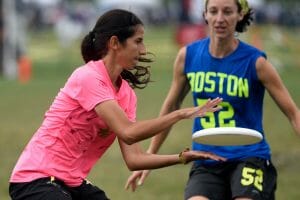
Toda mi vida he sido una persona tímida pero muy interesada y buena en los deportes. Revo (y Ultimate en general) me han enseñado a interactuar con personas a través del deporte de alta competencia. A mis amigos más cercanos los conocí jugando Ultimate (con y en contra) y esta es una de las cosas que más me gustan de este deporte; poder jugar en un alto nivel pero siempre con la oportunidad de hacer amigos de todo el mundo. El equipo de Colombia me ayudó a ser una mejor líder desde los mundiales U20 (2010-2012), también a conocer cómo es el mundo por fuera de Colombia, aprender inglés y hacer amigos mientras hago algo que me gusta mucho y es muy divertido.
Como jugadora, jugar internacionalmente desde que era pequeña nos hizo (a mi y a mis compañeras de equipo) entender mejor el juego y crear un estilo particular, lo cual ahora se ve reflejado en el desempeño de Revo.
En 2019 empecé una maestría en Puerto Rico y estaba preocupada de cómo mantenerme en forma para el WUGC 2020 y seguir compitiendo en torneos de alto nivel, entonces decidí hacer tryouts para un equipo de Estados Unidos ya que es un poco más cerca de Puerto Rico, es mucho más barato que viajar a Colombia y técnicamente no cuenta como un viaje internacional. Escogí Brute Squad porque desde afuera siempre me pareció un equipo que se ajustaba a mi personalidad y donde conocía algunas jugadoras desde World Games en 2017. Sin embargo, cuando era la época de try outs empezó el COVID y todo se canceló, pero este año el equipo se acercó a mí y me preguntó si todavía estaba interesada en unirme al equipo esta temporada y por supuesto fue un sí! (Gracias EQUIPO.)
Creo que es una gran experiencia jugar con un increíble grupo de personas y jugadoras y contra el mejor nivel en el mundo. También es muy divertido y exigente enfrentarse a partidos difíciles desde las primeras instancias de un torneo. Incluso ahora puedo decir que esta experiencia ya me ha hecho crecer como jugadora y como un miembro de la comunidad de Ultimate. Por ejemplo, he recibido mensajes de personas de Colombia y equipos preguntándome sobre torneos en Estados Unidos donde ellos puedan participar y hacer crecer su nivel. También estoy muy feliz y agradecida con todas los amigos nuevos que he hecho en este corto tiempo y me hacen querer regresar.
Sammi Wong, Chicago Nemesis, Age 29
Sammi Wong almost never heard of ultimate. In high school near Los Angeles, her competitive outlet was dance. She made it to her junior year at USC in total ignorance of frisbee. It wasn’t until she studied abroad at the University of Queensland in Brisbane, Australia that, looking for a way to make friends, she stumbled upon a pick-up game. The group invited her to play intramural, where she learned to throw a backhand and a flick. It wasn’t a deep introduction, but it proved fun enough to make her want to seek it out when she got back to the US.
Wong then became that rare phenomenon: a senior rookie. It was an interesting set-up because, unlike the freshman rookies, she already had a fully-formed college social life. “I wasn’t there to make a lot of new friends,” she says. Her focus that year was to probe the depths of the sport and her place within it as best as possible. And when the 2014 season ended that spring — a game-to-go loss against UCLA — she felt that she had a lot more to explore. In contrast to some of the other players, who had committed to the program for a full four or five years and were experiencing various levels of burn-out, Wong recalls, “I wanted to continue playing because I was just getting started.”
She didn’t know what that looked like, however. Her exposure to the full scope of the sport was still quite limited. Outside of the college game, she mostly knew about fun tournaments like LeiOut. But with a move to Chicago — where she didn’t know anyone — for a job, she needed a way to make friends again. Once more, she turned to ultimate. That fall and spring she played league, and eventually met some players with the club team Dish. It ended up being a good match. “It was great to learn from older, craftier players. I grew a lot in confidence.”
She played with Dish for four seasons, ending in 2018. Two of those years they played (and lost) the game-to-go for the second bid in the Great Lakes. With a much fuller awareness of the stakes than when she was starting out, Wong began to have greater ambition. Playing so close to the top created an itch to play at an even higher level. To that end, she signed on with Madison Heist in 2019. The timing wasn’t great. Heist had just lost a few of their top players, and then ended up losing to Minneapolis Pop for the lone North Central bid to Nationals.
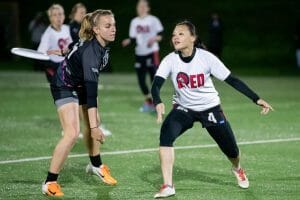
Wong and some of the other Chicago-based players doubled-down on training during the pandemic. “We didn’t pause just because club was paused,” she said. She and a small pod worked out, threw, and played mini together as often as they could. As a result, she said, “I came out of the pandemic as a more consistent player.”4 That put her on track to make the jump to Nemesis. When they offered her a roster spot, they said they would slot Wong in as one of the O-line handlers. It was a bit of a jarring assessment — she had never handled before. But what was she going to do, turn them down?
“Going to Pro Champs [this season] and handling against really good competition was pretty nerve-wracking,” said Wong. But having to perform at that level helped teach her to trust her teammates and to believe in her own abilities.
She vividly remembers the point against Columbus Rival to clinch the Great Lakes Regional title outright and send her to Nationals for the first time. It was on a big layout from Sarah Gnolek. “But the way she landed, you couldn’t really see whether she caught it. So when she stood up and showed off the disc, we went crazy.”
Wong has spent a lot of the time since that moment working on her mental preparation. At practice, Nemesis did an exercise in which they told each other, “‘You deserve to be here.’ But I don’t really believe it.” For a variety of reasons, including her somewhat unconventional and late arrival to the sport, and despite the obvious markers of success, she suffers a little from Impostor Syndrome. “I won, but I still have a lot of doubt,” says Wong. “I’m hoping that once I’m at Nationals, it will solidify that I deserve to be here.”
Reader, she does.
Fyiff is an acronym for ‘Fuck You, I’m from Florida.” ↩
It worked because soccer had a fall series. ↩
Note from Wong: “I acknowledge that I sit in a position of incredible privilege where my job, my lifestyle, etc. were flexible enough that the effects of the pandemic were limited for me. I know that this was not true for a lot of people. ↩